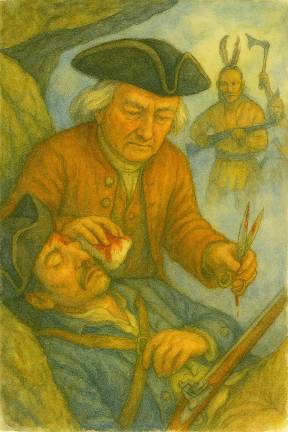During this prelude to the actual 250th anniversary of the signing of the Declaration of Independence we are looking at some of our local people who put their possessions and lives on the line for freedom for America. These are Patriots of the United States. Today we recognize Dr. Lt. Col. Benjamin Tusten.
Perhaps the most honorable record of one of our local Patriots is the service of Benjamin Tusten, Jr. His story is the kind that should have been recognized for the Medal of Honor, had it been appropriate for that time period.
Tusten came from a respectable family with a farm on the banks of the Otterkill Creek about 2 miles from Goshen in Orange County, N.Y. His father had been a member of the New York provincial congress in 1775.
Tusten was a physician who had been commissioned lieutenant colonel of the county’s 3rd Regiment of militia in February 1776. Benjamin Tusten was killed at the Battle of Minisink near present-day Barryville, N.Y., on July 22, 1779.
Dr. Tusten wanted to be a farmer, but he turned out to be proficient with education and studied Latin and Greek and mathematics and worked to become a medical doctor. He was a practitioner in Goshen. Dr. Tusten was “mild, modest, and unassuming in his manners, pleasant to his patients, and affable with all.” He had superior knowledge and was skilled at surgery.
The British, under Mohawk Chief Joseph Brant and accompanied by several groups of Indians and Tories along with Butlers Raiders, had attacked the area near today’s Port Jervis and burned buildings, killed and scalped and stole livestock and headed north along the Upper Delaware River.
The alarm rang out, with riders spreading the fearsome news. The scout Talmadge of Sussex County went to the area of today’s Hamburg and other express riders went toward Goshen. The call went out for militia; Dr. Tusten wrote a letter to General Washington in Newburgh. Men rounded up. In the Warwick area, Colonel Hathorn prepared to deploy. Lt Col Tusten took a lead group westward.
Near Greenville, they met up with a lead contingent from New Jersey with Major Meeker in charge. Reluctant to proceed until more men came, the “mild and modest” Tusten went along with the risky decision to proceed. They finally met up with Hathorn’s men near the crossing of the Delaware at Lackawaxen, the last point to catch the enemy before they moved westward to the eastern branch of the Susquehanna River.
A long day’s battle ensued, and the militia exhausted from water and wounding and weapons. Many retreated as the enemy approached in force. Men unable to move were at the mercy of the enemy who were known to kill and scalp. Dr. Tusten was encouraged to retreat with others but was heard to say, “I will never leave this ground” as he tried to save the wounded beneath the stone overhang shelter remembered as Hospital Rock.
Doctor Benjamin Tusten lost his life that day, along with 46 other militiamen from New York and New Jersey.
Lt. Col. Benjamin Tusten, Jr.—hero of the Battle of Minisink.
Bill Truran, Sussex County’s historian, may be contacted at billt1425@gmail.com He is the author of “Voices of ‘76: Americans Speak of our Freedom”
